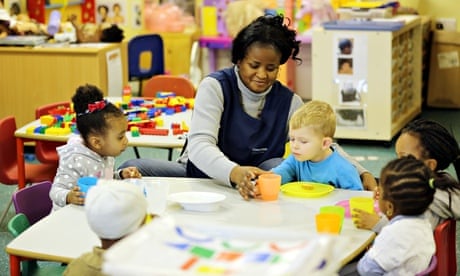The government has invested less than two-thirds of the estimated cost of properly funding childcare, recently released documents have revealed. According to these government briefing documents, the rates of funding for 2020-2021 did not meet the required amount to fund the free childcare initiative, which offers parents of three and four year old children thirty hours of free childcare per week.
The revelation comes after a freedom of information campaign by the Early Years Alliance (EYA), and demonstrates that ministers knew the level of investment needed, laid out in civil servants’ estimation of £7.49 per hour for a free childcare place by 2020-2021. The government chose not to provide the necessary funding, with an average rate of just £4.89 paid to local authorities, according to childcare research agency Ceeda. That’s £2,964 a year less than required per child.
The document, called Early Years Spending Review Scenarios, shows a clear intent by the government to pass the spending burden onto parents, stating “We will strip out funding for consumables (food, nappies) – and set an expectation that providers charge parents for these.” This document also acknowledges that to introduce the Tories’ thirty hour policy could lead to as much as a 30% increase in the cost for parents of young children not covered by the offer.
The EYA’s chief executive, Neil Leitch, argues “For years, the early years sector has warned that the so-called ‘free entitlement’ offer is anything but free, in the face of repeated government claims that the policy is adequately funded. These documents, which they spent more than two years trying to hide, prove otherwise.”
However, the Department for Education (DfE) claims that the data found by the EYA pre-dates increases to the rates, greater investment having been announced by the chancellor in 2019 and 2020. A spokesperson said “We’ve made an unprecedented investment in childcare over the past decade, spending more than £3.5bn in each of the past three years on our free childcare offers and increasing the hourly rate paid to councils above inflation for the past two years.”
Despite the DfE’s claims of “unprecedented investment”, the truth is that ministers are wilfully underfunding the childcare sector: they acknowledge in the released documents that “a 10% reduction in the cost of childcare might lead to a 1.4% increase in the employment rate for married mothers with pre-school age children,” yet the government chose to make childcare more costly regardless.
In a past study by Pregnant Then Screwed, almost a fifth of parents have quit work due to the cost of childcare, most of these women.
Tulip Siddiq, the shadow minister for children and early years, said “The government owes parents an apology for this reckless underfunding of early years and for covering it up. Ministers must now change their failed approach to early years, which must start with urgent action to prevent further childcare closures.”
The EYA’s Freedom of Information request was originally filed in December 2018, but the DfE rejected their request, despite a ruling by the Information Commissioner’s Office (ICO). In an attempt to keep the information hidden, the DfE appealed to the First Tier Tribunal against the ICO ruling, but eventually withdrew this appeal and released the documents.
The EYA’s Neil Leitch said “For so long, the government has tried to deflect the blame for rising childcare costs. But these documents prove, in black and white, that it knew that the introduction of the 30-hours policy, along with an insufficient level of investment, would result in higher costs for parents of younger children.”
“Only with fair and adequate funding will we ensure nurseries, pre-schools and childminders can continue delivering the quality, affordable care and education that children and families both need and deserve.”
Philip English, is a member of the YCL’s Manchester Branch



